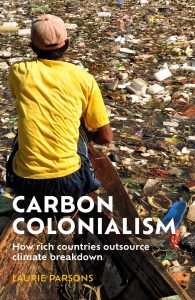In Carbon Colonialism: How Rich Countries Export Climate Breakdown, Laurie Parsons spotlights the injustice of global climate politics and policy which enable the Global North to outsource carbon production and waste disposal to the Global South. Emphasising the cost to developing nations who bear the severest effects of climate breakdown, Parsons makes a convincing case for radical collective action and an overhaul of the legal framework on climate, writes Sneha Biswas.
Carbon Colonialism: How Rich Countries Export Climate Breakdown. Laurie Parsons. Manchester University Press. 2023.
 “Extraction and exploitation have always gone hand in hand” – in Carbon Colonialism, Laurie Parsons uses this line to explain the simultaneous exploitation of natural resources and of the economically vulnerable section of the global population that is both historic and continuous. The history of imperialism was built upon these dual mechanisms, exemplified in the US’s supremacy in highly land- and labour-intensive cotton production, made possible only through exploitation of slaves. Though slavery has been abolished, today’s global economy continues to run on these same mechanisms of exploitation. In the name of the global supply chain, the outflow of raw materials or natural resources (from poor nations to rich nations) and exploitation of cheap labour from developing countries continue. Even though rich nations are highly dependent on developing countries for their industrial inputs at different levels of production, developing nations are denied profit gains.
“Extraction and exploitation have always gone hand in hand” – in Carbon Colonialism, Laurie Parsons uses this line to explain the simultaneous exploitation of natural resources and of the economically vulnerable section of the global population that is both historic and continuous. The history of imperialism was built upon these dual mechanisms, exemplified in the US’s supremacy in highly land- and labour-intensive cotton production, made possible only through exploitation of slaves. Though slavery has been abolished, today’s global economy continues to run on these same mechanisms of exploitation. In the name of the global supply chain, the outflow of raw materials or natural resources (from poor nations to rich nations) and exploitation of cheap labour from developing countries continue. Even though rich nations are highly dependent on developing countries for their industrial inputs at different levels of production, developing nations are denied profit gains.
Vulnerable workers in developing countries […] continue to suffer low wages, longer working hours and unsafe conditions. More than that, they are rendered invisible within the global supply chain.
The main argument of the book revolves around the current status of the global supply chain which has changed drastically in the last few decades. The globalisation of goods and trade has led to the splintering of a good’s production, consumption, and waste disposal among different countries. The production phase itself is divided into many stages. Parsons has years of experience researching the brick kilns and cotton factories of Cambodia, and his field experience is reflected throughout the book to demonstrate how climate precarity is exported to developing countries. Here, Parsons highlights the lack of accountability for giant corporates. Most of them build their manufacturing units in lower-income countries, but when it comes to commercial rules and regulations, they are largely governed by the laws of their origin country. Thus, they are at a safe remove from the distressing problems of child labour, bonded labour and other forms of injustice. Parsons illustrates how this global injustice and exploitation continues through examples from different industries throughout the book, including bricks, clothing and food. He argues that the existing legal framework fails to deliver fairness and justice to these vulnerable workers in developing countries, who continue to suffer low wages, longer working hours and unsafe conditions. More than that, they are rendered invisible within the global supply chain.
However, the impact of climate change materialises at the local level and is intertwined within the socio-cultural conditions where people live. For example, the impacts of climate change on the farmers facing drought in India (or Cambodia), cyclones faced by Bangladeshi farmers, or the negative health impact on brick kiln workers are far worse than any developed nation’s experiences. The concept of socio-economic vulnerability argues that a weak economic structure, poor living conditions, health vulnerabilities, political conflicts and instability make a certain section of the population much more vulnerable than others. Further, global warming and related climate issues are amplifying these exploited people’s precarity, creating environmental migrants.
Global warming and related climate issues are amplifying these exploited people’s precarity, creating environmental migrants.
Another important aspect which the author highlights is the Global North’s “greenwashing”, a process through which companies try to portray themselves as “eco-friendly” and “green” by false claims and sharing misleading information. These companies advertise their practices as sustainable without having any solid evidence, and by hiding the damages they are causing to the environment. Hence, changing individual consumer behaviour and buying green, eco-friendly products is not a sustainable solution. Instead, the author suggests that the consumers should identify these gimmicks, protest against them and collectively demand change.
In discussions around holding companies to account (at global climate forums and conferences) and protecting nature and vulnerable populations, wealthier nations hold the power.
But in discussions around holding companies to account (at global climate forums and conferences) and protecting nature and vulnerable populations, wealthier nations hold the power. At COP27, demands for financial assistance made by small and developing countries around loss and damage did not reach any concrete solution, a pattern which has recurred at all the summits. However, there is a huge gap between the reality of climate breakdown in developing nations, and the expectations around what these world summits can achieve, and the interests of polluting corporations. In academia, the debates are largely dominated by white and privileged populations. In England, only 15% of people working in academia come from a working-class background; 50% come from upper-middle class (or “private and managerial”, in Parsons’ words) backgrounds. Hence, we need to question the geopolitics of knowledge generation and the dominance of the West in the larger discussion on environment and climate change.
We need to question the geopolitics of knowledge generation and the dominance of the West in the larger discussion on environment and climate change.
In contrast with the developed nations’ perceptions, the deep cultural values embedded in many traditional societies see beyond the economic valuation of the nature. They value nature for its spiritual importance and cultural significance. Because of this philosophy, natural resources were preserved over centuries; forests from India to Tasmania and across the globe were untouched by their inhabitants for millennia. Hence, the author suggests that instead of measuring environmental goods by their economic value, developed nations should learn from these traditional societies how to protect and value nature.
To understand carbon colonialism, a close inspection of the global supply chain and the authorities leading the global climate change debate is crucial.
Parsons defines “carbon capitalism” as “outsourcing carbon emissions from richer countries to poorer countries.” To understand carbon colonialism, a close inspection of the global supply chain and the authorities leading the global climate change debate is crucial. The Kyoto protocol set the path for earning and trading carbon credits; and it has been a game changer in the global climate debate. For the first time, it held the developed nations responsible for the larger part of global carbon emission. However, the author suggests that the international mandate on carbon accounting should be based on consumption rather than production. This can be done through expanding the scope of carbon emissions. Developed nations are the biggest consumers, and the production is largely outsourced to developing nations. The domestic and environmental rules and regulations around production need to be reformed to make the system fairer for developing nations.
Parsons argues that individual consumer behaviour cannot change the situation. Identifying and accepting the source of the problem, collective activism and a change in the global legal framework around climate policy are what we need most.
The targets and commitments to mitigate the global climate crisis are far from being met, and in response, young people are increasingly agitating for change. Most of them feel that only a radical shift in attitudes and action on climate change can effect real change. Parsons argues that individual consumer behaviour cannot change the situation. Identifying and accepting the source of the problem, collective activism and a change in the global legal framework around climate policy are what we need most. Clear and accurate climate science data are also essential. Carbon Colonialism advocates for a perspective shift to use carbon consumption, rather than production, as the main yardstick for global emissions. Parsons’ major contribution through this book is to identify the political economy of climate change and the vulnerabilities which emerge from it. The book will be especially helpful for economists, political economists and geographers who research issues around climate change policy and accountability. However, anyone interested the current global environmental problem, climate change and sustainability issues will find this book captivating. The book lays bare the dismal state of the global climate crisis and argues convincingly that protecting the planet must go hand in hand with ensuring fairness, equity and social justice for all people.
Note: This review gives the views of the author, and not the position of the LSE Review of Books blog, or of the London School of Economics and Political Science. The LSE RB blog may receive a small commission if you choose to make a purchase through the above Amazon affiliate link. This is entirely independent of the coverage of the book on LSE Review of Books.
Image Credit: Asian Development Bank on Flickr.






